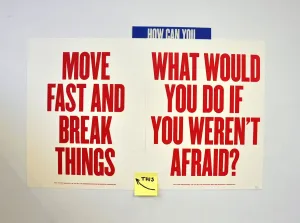
Have you ever been on a team of incredibly intelligent people who just couldn’t get out of their own way to get any good work done?
Systems change literature tells us that “trust, pro-social values, teamwork, and distributed leadership” are all enabling environment conditions that facilitate systems change. But the literature falls short when it comes to detailing the specific interventions that bring about this enabling environment.
Recently, we at Brink set out to investigate and uncover some practical, team level strategies that we found to be impactful in our work, so we could codify them and share them with others. The result is a checklist that we can use to reflect on our own team dynamics and give us some prompts about improvement we can make when things don’t feel like they’re quite humming.
Some practical strategies for smarter teams
Below is a collection of behaviours and methods that can be seen at Brink on our best days. There are 15 of them in total, starting with individual elements and extending into the broader team set up.
Of course you can’t do all these things all the time, and even if you did there’s no guarantee they would create ‘the perfect team’. But hopefully this can act as a checklist that you can look to for some actionable advice if your team seems to be losing direction or isn’t having the impact it had hoped for.
1. Bring your energy and don’t lose sight of your ‘why’. When you get into the humdrum of doing work for the sake of it, energy tends to dwindle. But if you're working in the impact space your 'why' is probably your greatest energy provider. If you can remind yourself of your why then energy will follow.
2. Own your mistakes. Say when something isn’t working. The big challenges in the world require all of us to be raising a flag when something doesn't feel like it's going according to plan.
3. Ask what is not working. A bit of a riff on number 2: ask others what's not working. Surface those gremlins or those cautionary instincts that we each have in us so that we can improve the work.
4. Pursue clarity. A lot of these high stakes and complex changes require crystal clarity across the team. Do we know why we're here? Do we know what we're doing? Then we can pursue it at any cost.
5. Know you don't know everything and know how you are going to learn. The answer to this might be 'I'm never gonna know' it or it could be, 'I need to set up a research agenda in order to understand it a bit better' or it might be 'I'm going to partner with people who know this stuff much better than I do'. The important thing is to be humble around what you don't know, and be clear around what you don't have and how you're going to get there.
6. Demand respect, because we all deserve it.
7. Establish structures (kickoff, rhythms, design how to work together). When the rest of the world is uncertain, you need these handrails for a team to get into a groove
8. Work out “who’s who in the zoo”. Uncover people's passions and give them work that matches who they are.
9. In a new context, ask how people communicate here, especially speaking up about problems. Respect your context and learn the ropes to respectfully disagree and share concerns with those around you.
10. Prioritise having everyone on the same page. And keep checking in. The idea is to create a team that is focussed on impact and able to raise a hand if they don’t think the work is on track. The only way this is possible is when everyone knows where we are in a project and why.
11. Understand who is in the room and what they’re motivated by, or limited by. Getting to grips with personal motivations, ambitions and challenges will make or break a project. Whether we like it or not, these factors all come to work with us, if we don’t acknowledge them and make them concrete they don’t cease to exist, they cease to be part of the solution.
12. Make sure that everyone is heard. Anyone on a team could see something or have an insight that could change the game!
13. Use empathy, understand perspectives and be in connection. It’s too easy to pick out the ‘bad apples’ in a team and write them off. By working to see their perspective and keeping in mind their own needs and challenges then you can bring them in, not push them out.
14. Produce a synthesis in which everyone can see themselves. Ask people what they think and write it down so that the whole team can see how they have influenced the way forward.
15. Model all of this as a team. Test new approaches, validate your hunches and bring the team together around the work.





